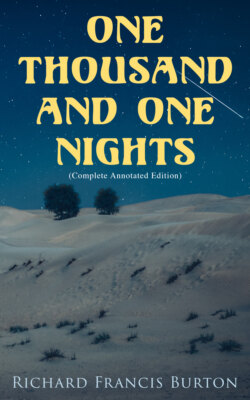Читать книгу One Thousand and One Nights (Complete Annotated Edition) - Richard Francis Burton - Страница 44
На сайте Литреса книга снята с продажи.
When it was the Twentieth Night,
ОглавлениеTable of Contents
She said, It hath reached me, O auspicious King, that the Caliph swore he would hang none but the slave, for the youth was excusable. Then he turned to Ja’afar and said to him, “Bring before me this accursed slave who was the sole cause of this calamity; and, if thou bring him not before me within three days, thou shalt be slain in his stead.” So Ja’afar fared forth weeping and saying. “Two deaths have already beset me, nor shall the crock come of safe from every shock.’ 360 In this matter craft and cunning are of no avail; but He who preserved my life the first time can preserve it a second time. By Allah, I will not leave my house during the three days of life which remain to me and let the Truth (whose perfection be praised!) do e’en as He will.” So he kept his house three days, and on the fourth day he summoned the Kazis and legal witnesses and made his last will and testament, and took leave of his children weeping. Presently in came a messenger from the Caliph and said to him, “The Commander of the Faithful is in the most violent rage that can be, and he sendeth to seek thee and he sweareth that the day shall certainly not pass without thy being hanged unless the slave be forth. coming.” When Ja’afar heard this he wept, and his children and slaves and all who were in the house wept with him. After he had bidden adieu to everybody except his youngest daughter, he proceeded to farewell her; for he loved this wee one, who was a beautiful child, more than all his other children; and he pressed her to his breast and kissed her and wept bitterly at parting from her; when he felt something round inside the bosom of her dress and asked her, “O my little maid, what is in thy bosom pocket?”; “O my father,” she replied, “it is an apple with the name of our Lord the Caliph written upon it. Rayhán our slave brought it to me four days ago and would not let me have it till I gave him two dinars for it.” When Ja’afar heard speak of the slave and the apple, he was glad and put his hand into his child’s pocket 361 and drew out the apple and knew it and rejoiced saying, “O ready Dispeller of trouble “ 362 Then he bade them bring the slave and said to him, “Fie upon thee, Rayhan! whence haddest thou this apple?” “By Allah, O my master,” he replied, “though a lie may get a man once off, yet may truth get him off, and well off, again and again. I did not steal this apple from thy palace nor from the gardens of the Commander of the Faithful. The fact is that five days ago, as I was walking along one of the alleys of this city, I saw some little ones at play and this apple in hand of one of them. So I snatched it from him and beat him and he cried and said, ‘O youth this apple is my mother’s and she is ill. She told my father how she longed for an apple, so he travelled to Bassorah and bought her three apples for three gold pieces, and I took one of them to play withal.’ He wept again, but I paid no heed to what he said and carried it off and brought it here, and my little lady bought it of me for two dinars of gold. And this is the whole story.” When Ja’afar heard his words he marvelled that the murder of the damsel and all this misery should have been caused by his slave; he grieved for the relation of the slave to himself, while rejoicing over his own deliverance, and he repeated these lines:—
“If ill betide thee through thy slave,
Make him forthright thy sacrifice:
A many serviles thou shalt find,
But life comes once and never twice.”
Then he took the slave’s hand and, leading him to the Caliph, related the story from first to last and the Caliph marvelled with extreme astonishment, and laughed till he fell on his back and ordered that the story be recorded and be made public amongst the people. But Ja’afar said, “Marvel not, O Commander of the Faithful, at this adventure, for it is not more wondrous than the History of the Wazir Núr al-Dín Ali of Egypt and his brother Shams al-Dín Mohammed. — Quoth the Caliph, “Out with it; but what can be stranger than this story?” And Ja’afar answered, “O Commander of the Faithful, I will not tell it thee, save on condition that thou pardon my slave;” and the Caliph rejoined, “If it be indeed more wondrous than that of the three apples, I grant thee his blood, and if not I will surely slay thy slave.” So Ja’afar began in these words the
